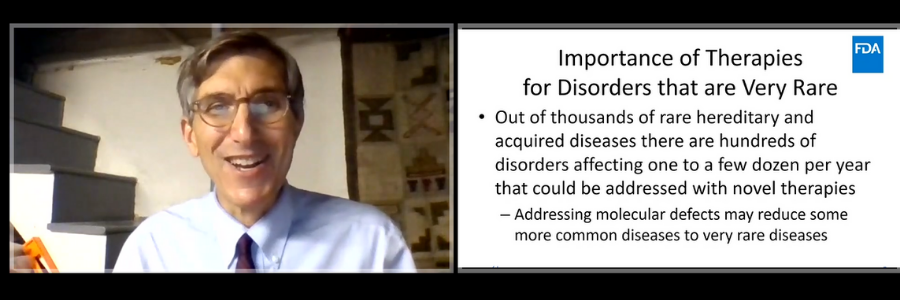ASGCT Policy Summit: Peter Marks on Bespoke Gene and Cell Therapies
Emily Walsh Martin, Ph.D. - September 28, 2020
At the ASGCT Policy Summit, FDA CBER Director Peter Marks, M.D., Ph.D., spoke about the unique challenges in developing gene and cell therapies for very rare diseases.

Many of us, especially those of us who started our drug development careers in the small molecule space, may have an image of government regulators as reserved, inscrutable, and, frankly, opaque. I think it is fair to say that Peter Marks, M.D., Ph.D., director of the FDA Center for Biologics Evaluation and Research (CBER), bears no resemblance at all to those preconceived notions. Certainly, Marks answers some questions with the obligatory: “It depends.” And his common refrain is to “come talk to us.” However, along the way, Marks consistently delivers useful specifics to help us contextualize the FDA guidance for cell and gene therapies. And in doing so he demystifies the thinking of the agency, making explicit their logic and rationale.
At the ASGCT Policy Summit, Marks spoke about the unique challenges in developing gene and cell therapies for very rare diseases. He highlighted that at the end of the day rigorous evidence and manufacturing excellence will guide approvals; however, he also provided a window into the ongoing creative thinking at CBER to help ease the burden of developing therapies for small indications with dozens to a few hundreds of patients.
In particular, he examined the case of a hypothetical portfolio of gene therapies wherein the same vector manufactured by the same process was being used to deliver different (but similarly sized) payloads. In this context, Marks believes that one could imagine a path where the aggregate data across multiple products would be considered holistically to support the approval of individual products. Moreover, he described ideas around simplification of documentation, perhaps to the level of templates which would ease the regulatory burden for IND submissions and clinical protocols for these therapies which might only seek to treat a handful of patients.
Marks also introduced the idea that as we progress our understanding of manufacturing for viral vectors, we might be able to achieve a “cookbook” of sorts which might be used by academic investigators to streamline the path of transferring an academic-initiated product to a contract or traditional manufacturer capable of supporting phase 3 and/or commercial manufacturing.
In the question and answer session, he shared his thoughts on what the FDA will require moving forward given the immense volume of new preclinical effort in the space: “We need a doubling in size in gene and cell therapy… well, maybe not exactly a doubling, but we need a significant increase” in staff members. And he acknowledged the challenges that sponsors have been facing of late given the current bandwidth issues.
But most importantly he reconfirmed the value the FDA places on the work we are all doing, “We are still extremely excited about gene therapy and advancing it as fast as we can.” This is a sentiment I think we all hold dearly.
If you're interested in watching Marks' talk, you can still register to access all the Policy Summit sessions, which are available for registered attendees to watch for 30 days after the event.
Dr. Walsh Martin is a principal at Tremont Therapeutics and a member of the ASGCT Communications Committee.
Related Articles